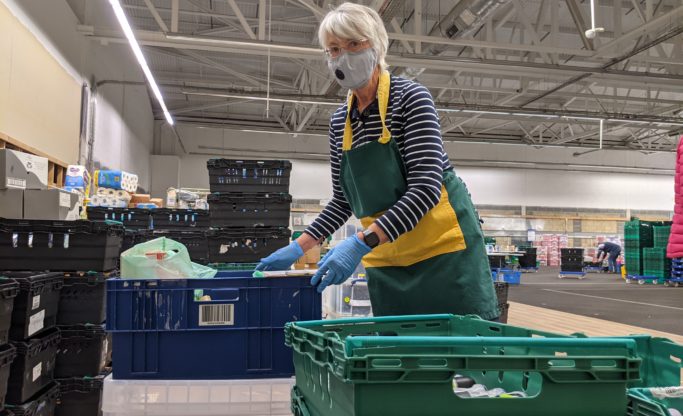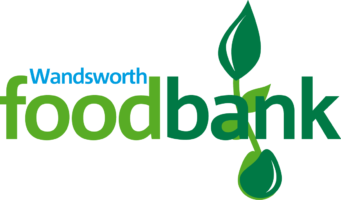
New research reveals people forced to food banks at start of pandemic faced extreme poverty, with just £248 a month to survive on after housing costs.
Today, we welcome the Trussell Trust’s State of Hunger 2021, an expert study shedding light on groups of people across the UK disproportionately affected by hunger and the drivers behind food bank use.
During the pandemic, Wandsworth Foodbank provided more than 11,300 emergency food supplies to people in financial hardship across Wandsworth (April 2020-March 2021) – a 76% increase compared to the same period the previous year. Four in ten emergency food supplies were for children – the majority of whom were primary school age or younger.
In total, Wandsworth Foodbank supported nearly 6,000 individual local adults and children referred to us by statutory and voluntary agencies, because they couldn’t afford basic food and essentials – twice the number compared to the previous year. These figures are the tip of the iceberg, as they don’t include other emergency food aid provided across the borough during the pandemic by other local charities and individuals.
Today’s national research finds more than six in ten (62%) working-age people referred to a food bank in early 2020 were disabled – that’s more than three times the rate in the UK working age population. And single parent families are more likely to be forced to a food bank, with almost one in five (18%) households referred to food banks during the pandemic being single parents – that’s more than twice the rate in the general population (8%).
Trussell Trust – of which Wandsworth Foodbank is a part – says hunger in the UK isn’t about food, it’s about people not having enough money for the basics. We couldn’t agree more.
In fact the research shows extremely low income is a key factor in driving people to food banks. In early 2020, the average monthly household income after housing costs for people who needed to use a food bank was £248 on average, or £8 a day for a couple without children. This needs to cover energy and water costs, council tax, food, and other essentials and is just 13% of the average national income.
In fact, in early 2020, 95% of people referred to food banks in the Trussell Trust network, like ours, were living in ‘destitution’ – this means people cannot afford to eat and stay warm and dry.
The main reason people had such low income was due to social security payments failing to cover the cost of living, according to the research. This was more often than not due to the design of the system, including issues such as the five-week wait for a first Universal Credit payment and low levels of payments.
Worryingly, the charity says people living in destitution risk being further pulled under by difficulties, such as debt and mental health issues. The research finds in mid-2020 nine in 10 households at food banks were in debt, while six in 10 had arrears on bills and owed money on loans.
In mid-2020 47% of all people using food banks and 41% of disabled people referred were indebted to the Department for Work and Pensions (DWP) making it the most common creditor to people at food banks. People experiencing poor mental health referred to food banks in the Trussell Trust network grew from around half (51%) in early 2020 to almost three quarters (72%) in mid-2020.
With high rates of unemployment and redundancies, the charity says more people than ever are now likely to need the social security system to provide a lifeline to keep them afloat. The charity says this should start with keeping the £20 increase to Universal Credit, introduced during the pandemic but set to be removed in the autumn.
The findings will be discussed by panelists such as Dame Louise Casey and Baroness Stroud at an All-Party Parliamentary Group event on destitution later today.
Emma Revie, chief executive of the Trussell Trust, said:
“How can anyone in this country stay warm and dry and buy food on just £248 a month after rent? People struggling in extreme poverty are pushed to the doors of food banks because they do not have enough money to survive. Hunger in the UK isn’t about food – it’s about people not being able to afford the basics.
“We know we can change this. We need to change the conversation around poverty and take action together. We need government at all levels to commit to ending the need for food banks once and for all and to develop a plan to do so. It’s time for government to make this a priority – to recognise that it must be an essential part of their levelling up agenda to work towards a hunger free future where we can all afford the basics.”
Dame Louise Casey, former government adviser on social policy, said:
“This research today by the Trussell Trust is deeply worrying with record food bank use showing that too many people have been pushed into hardship by the pandemic.
We have to stand together as we pull through this pandemic and not leave people behind, forced to rely on foodbanks and handouts to keep going. That is an abject failure by Government and all of us. Food aid should be a one off in the UK not a new form of charity.
It is in this government’s gift to end hunger, but it warrants a concerted cross government and cross-party action – a plan to end the need for food banks, delivered as an urgent priority”.
Dan Frith, Wandsworth Foodbank Manager, says:
“Sadly, this sobering report reflects what our team sees and hears each day as we support our neighbours across Wandsworth Borough who are facing extreme financial hardship. It’s a privilege to stand in the gap and help each person referred to us – but emergency food aid is not the solution.
Today we join the call to all levels of government to commit to ending the need for food banks like ours. Prevention is better than cure, and we must come together to rebuild a society where structures of support are in place to prevent these levels of destitution and misery.”
If you want to take action, you can sign up to Trussell Trust’s Hunger Free Future movement www.trusselltrust.org/hungerfree, to become part of a new conversation about how, together, we can end the need for food banks in the UK.
At Wandsworth Foodbank, we’re currently working on our own local research, looking at the drivers of food bank use and the impacts of poverty and destitution in Wandsworth – due to be published in June.


